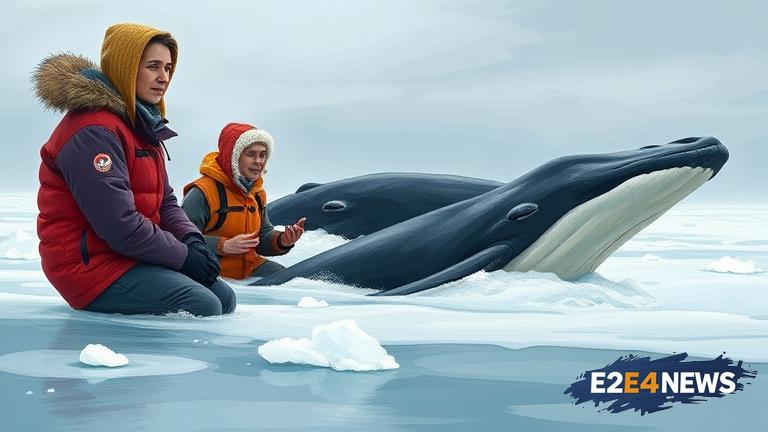A pioneering research project focused on the study of bowhead whales has taken a significant step forward by hiring experienced Inuit guides from the communities of Iglulik and Clyde River. This innovative collaboration aims to bridge the gap between traditional knowledge and modern scientific research, providing a unique opportunity for scientists to learn from the expertise of local guides. The bowhead whale research project is designed to investigate the behavior, migration patterns, and habitat of these incredible animals, with the ultimate goal of informing conservation efforts and ensuring the long-term sustainability of bowhead whale populations. By working together, scientists and Inuit guides can share knowledge and expertise, fostering a deeper understanding of the complex relationships between bowhead whales and their Arctic environment. The Inuit guides, hailing from Iglulik and Clyde River, bring a wealth of traditional knowledge and experience to the project, having spent their lives observing and interacting with bowhead whales in their natural habitat. Their participation is crucial in providing context and insight into the cultural and historical significance of bowhead whales in Inuit communities. The research project will employ a range of cutting-edge techniques, including satellite tracking, acoustic monitoring, and genetic analysis, to gather data on bowhead whale behavior and ecology. By combining these modern methods with traditional knowledge, the project aims to develop a more comprehensive understanding of bowhead whale biology and ecology. The collaboration between scientists and Inuit guides is expected to yield valuable insights into the impact of climate change on bowhead whale populations, as well as the effects of human activities such as shipping and hunting. The project’s findings will be used to inform conservation efforts and management decisions, ensuring that bowhead whale populations remain healthy and sustainable for generations to come. The hiring of Inuit guides from Iglulik and Clyde River is a significant milestone in the project’s development, marking a new era of cooperation and collaboration between scientists and local communities. This partnership is expected to have far-reaching benefits, not only for the conservation of bowhead whales but also for the communities involved, as it promotes cultural exchange, knowledge sharing, and capacity building. The project’s success will depend on the continued collaboration and cooperation between scientists, Inuit guides, and local communities, highlighting the importance of inclusive and community-based research approaches. As the project progresses, it is expected to provide new opportunities for education, training, and employment, contributing to the social and economic development of Inuit communities. The bowhead whale research project is a testament to the power of collaboration and the importance of respecting and valuing traditional knowledge in modern scientific research. By working together, scientists and Inuit guides can achieve great things, advancing our understanding of the natural world and promoting the conservation of incredible species like the bowhead whale. The project’s outcomes will have significant implications for the management and conservation of bowhead whale populations, as well as for the development of sustainable and responsible practices in the Arctic region. As the Arctic environment continues to face numerous challenges, including climate change, pollution, and human impact, the need for collaborative and community-based research approaches has never been more pressing. The bowhead whale research project is a shining example of what can be achieved through cooperation and collaboration, demonstrating the potential for science and traditional knowledge to come together in pursuit of a common goal. The project’s success will be measured by its ability to provide meaningful insights into bowhead whale biology and ecology, as well as its impact on the conservation and management of these incredible animals. With the participation of Inuit guides from Iglulik and Clyde River, the project is well on its way to achieving these goals, paving the way for a new era of collaborative research and conservation in the Arctic.
